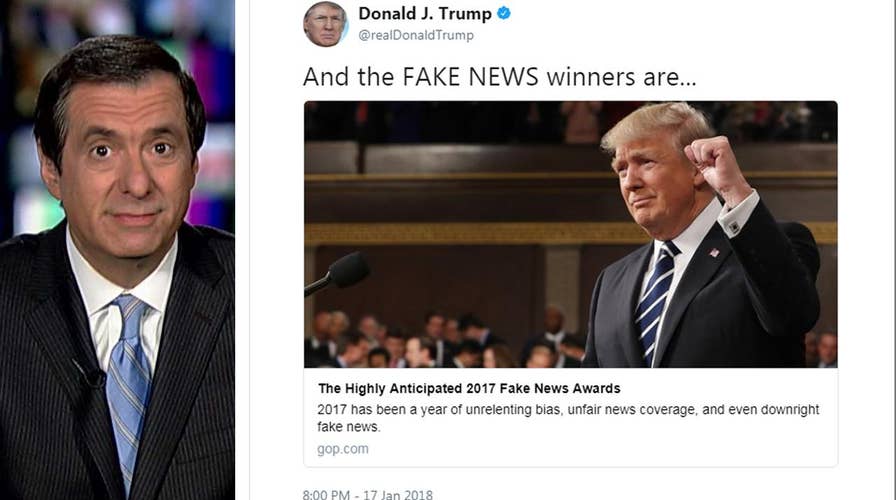Kurtz: A rough year for the press
'MediaBuzz' host Howard Kurtz weighs in on the recently announced winners of the '2017 Fake News Awards' as decided by the Trump administration.
It was red meat without the red carpet.
With no fanfare and no opening of envelopes, President Trump finally unveiled his so-called “fake news” awards—on an RNC website that promptly crashed.
Perhaps it was done without the usual Trumpian flair, but the 10 cases are basically accurate, though I have a couple of quibbles. CNN walked off with four of the not-so-coveted prizes, with the New York Times securing two and one apiece for ABC, Time, the Washington Post and Newsweek.
The president has every right to criticize news organizations, and the “awards” gimmick has already succeeded in generating coverage by the MSM.
But what’s striking is that in most of these cases, the news outlets ran corrections or retractions or apologized. And in some instances, severe disciplinary action was taken.
That means there has been some accountability. It doesn’t let the news organizations and journalists off the hook for bad judgment or a reckless rush to publish, and it’s fair to suggest that antipathy toward the president may have played a role, but it mean the stories weren’t deliberately fabricated.
So let’s run through the winners:
--New York Times columnist Paul Krugman said the day after the election the stock markets would “never” recover from Trump’s victory. That was a spectacularly wrong forecast by the Nobel Prize-winning economist—the Dow is up 8,000 points since then—but it was a prediction by a pundit, not a news story.
--ABC’s Brian Ross erroneously reported that Trump ordered Mike Flynn to make contact with the Russians during the campaign, but it actually occurred during the transition, which is routine. The false story was at least partially responsible for a 350-point drop in the Dow. ABC corrected the story and suspended Ross for a month.
--CNN reported that Donald Trump Jr. had special, early access to hacked Democratic emails through Wikileaks. The network admitted it had the date wrong and the material was already public by the time that Wikileaks contacted the president’s son.
--Time falsely reported on Jan. 20, 2017 that Trump had removed the Martin Luther King bust from the Oval Office. Reporter Zeke Miller didn’t see it and apologized for the erroneous report hours later.
--The Washington Post, as a newspaper, did not erroneously report that Trump’s packed rally in Pensacola was half-empty. Post reporter Dave Weigel said that in a tweet with a picture of the arena that had been taken hours earlier. He apologized for the blunder, which underscored the dangers of tweeting on the run.
--CNN did not misleadingly edit a video to show Trump overfeeding fish in a koi pond with Japanese Prime Minister Abe, but did needlessly mock him along with other news outlets. CNN used pool video that was shot in a misleading way, because it didn’t show Trump following Abe’s lead in dumping the rest of his box of food into the pond. A very fishy story.
--CNN falsely accused Trump adviser Anthony Scaramucci of a secret meeting with a Russian. This is probably the worst mistake in the bunch, and the network retracted the online story after a legal threat from the Mooch. But CNN also forced the resignations of three top journalists who had worked on the piece, an admission of the severity of the error.
--Newsweek did falsely report that Polish First Lady Agata Kornhauser-Duda did not shake Trump’s hand, awkwardly bypassing him for Melania Trump. But video shows the president did shake her hand soon afterward. Newsweek merely posted an “update” to the discredited story.
--CNN did falsely report that James Comey, in Hill testimony, would dispute the claim that the former FBI chief had told him he wasn’t under investigation in the Russia probe. Comey backed up Trump’s account. That was an inexcusable error, especially since we would all find out anyway once the hearing was held.
--The New York Times did erroneously report in a front-page story that the administration was hiding a report on climate change. The Times ran a correction saying that the report was available online, though it had not been “widely publicized”—a very different situation.
These mistakes vary in magnitude, but they reflect a tendency to overreach or underreport when it comes to covering Trump, and always in a negative direction. There are, of course, many other stories that the president criticized last year that were accurate and legitimate. But the blunders help give the business a black eye.





